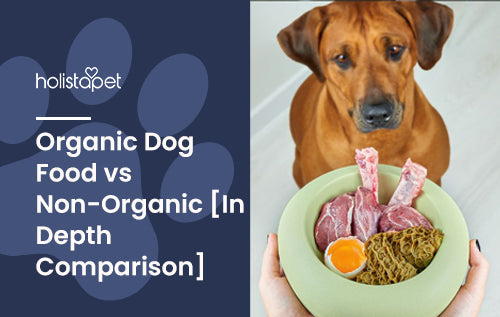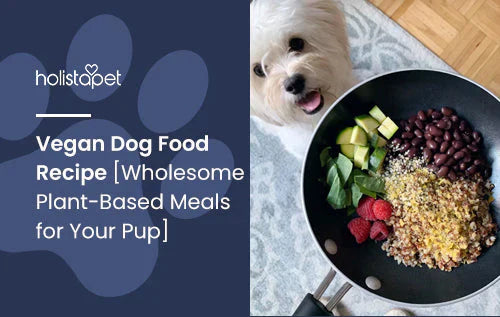Now that we as a culture have become more aware of our health choices, owners are transferring that attention over to their pets. Dog owners across the globe ask themselves, what is the difference between organic dog food versus non-organic? Regulations for human food follows much higher standards than dog food. Up until recently, there has been little to no concern for the pet food industry.
Most owners have been giving their dogs low-nutrient processed meals because their knowledge and access to healthier choices were limited. It's 2020 now, and we have a wealth of information at our fingertips. So, there is no excuse to continue feeding your beloved dog hurtful or unhealthy ingredients. The differences between organic dog food and non-organic dog food may startle you.
What is Organic Dog Food?
The term "organic" has become so widespread, it almost feels like it lost its meaning. In 2001, Congress established the National Organic Program (NOP). This federal regulatory program develops and organizes national standards for organically-produced agricultural products sold in the US. Since the NOP is essentially in control of what organic means to producers, their definition is the one that matters.
They define organic products as being, “produced through approved methods that integrate cultural, biological and mechanical practices that foster cycling of resources, promote ecological balance and conserve biodiversity. Synthetic fertilizers, sewage sludge, irradiation, and genetic engineering may not be used.” While this definition is made for human food, and pet food is not regulated as carefully, AAFCO works to ensure pet companies are adhering to that description as closely as possible.
The Association of American Feed Control Officials (AAFCO) is a private corporation. Most of the board members are agents from major feed manufacturers and ingredient suppliers. AAFCO helps to regulate the pet food market with help from voluntary membership associations at local, state, and federal agencies. Their goal is to help educate and protect consumers.
AAFCO's definition of organic pet food is, "a feed or feed ingredient derived solely from plant, animal or mined sources, either in its unprocessed state or having been subject to physical processing, heat processing, rendering, purification, extraction, hydrolysis, enzymolysis or fermentation, but not having been produced by or subject to a chemically synthetic process and not containing any additives or processing aids that are chemically synthetic except in amounts as might occur in good manufacturing practices."
Is Organic Dog Food Healthier?
Doctors and scientists have yet to agree that all organic food is “healthier” than conventionally grown foods. However, the general consensus is that ingesting less harmful chemicals will promote better overall health. Just like in humans, diet is the most important factor when it comes to your dog's health. Organic dog food is void of harmful processed ingredients that are bad for your dog's health.
Organic dog food will have fewer chemicals such as fungicides, herbicides, and insecticides.
Dog food that is organic should also be fresher because it does not contain a slew of preservatives to keep it on shelves longer. The meats in organic dog foods are also void of harmful growth hormones and antibiotics that linger in meat long after it has been packaged for consumption. Eliminating, or limiting, hormones, animal by-products, pesticides, and GMOs in your dog's diet can lead to a healthier pet. This is why we only use organic ingredients in our dog treats and dog products.

Is Organic Dog Food Better for the Environment?
Simply put, yes, organic products, in general, are better for the environment. The USDA's NOP program forbids vegetation that bears the official organic logo to be grown in soil that has been treated with certain chemicals. In fact, the soil must have no prohibited substances applied for three years prior to harvest. If the soil contains contaminants any food that grows from it will not qualify as organic. By eliminating chemicals in the soil, the Earth receives no contamination in that area.
When it comes to organic meat, regulations demand that animals live in suitable living conditions. They must also be able to graze naturally. The animals must be fed 100% organic feed and forage. They can't receive any antibiotics or hormones. Subsequently, these animals will produce excretion that isn't filled with various synthetic chemicals. This promotes a better environment for other organisms living on the planet.
How can Organic Dog Food Help Your Dog?
Eliminating potentially harmful products from food can help promote a healthier existence for your dog. One study, enacted by a middle schooler Ria Chhabra, has gained attention in the medical world. Ria did a science fair project based on fruit flies eating organic and non-organic foods to see if there was any difference.
The fruit flies eating organic food displayed longer life spans and fertility than those fed conventional foods of the same type. The organically fed flies endured starvation and stress much better than the other flies. Scientists were so impressed by Ria's findings, they helped publish her study in a scholarly reviewed journal.
Related: How to Keep Flies Off Dogs [In 6 Quick and Easy Steps]
All food processing is not bad (cans of pre-cut vegetables or fruits in their own juice are good). However, there are studies that link some processed foods to certain health issues. Research in France discovered that people who consumed more processed foods were more likely to have heart disease. In Spain, a similar study determined that eating processed foods is connected to a higher risk of death due to adverse health.
Another study by the Researchers at the National Institutes of Health found that humans ate, on average, an extra 500 calories a day when placed on a processed food diet in comparison to an unprocessed diet. Higher calorie intake is directly related to obesity and metabolic disease. Organic dog foods can reduce the risks associated with heavily processed products.
Besides disease, some non-organic ingredients may also cause digestive issues, especially if it undergoes heavy processing. High levels of preservatives and chemicals can lead to diarrhea in dogs, appetite discrepancies, and over time it may even cause damage to the digestive tract.

Best Organic Ingredients for Dog Food
If you're looking to convert your canine to an organic diet, you have made a great choice! Remember to just look for the organic label. There are several organic superfoods for dogs that help encourage good health. These superfoods are also good for humans. So we encourage you to snack on these choices as well.
Blueberries
Blueberries are full of phytochemicals, which are magnificent for your dog. This fruit gets its color from anthocyanidins, which are potent antioxidants. Blueberries also contain vitamins C and E, manganese, and fiber. It is best to introduce blueberries to your dog's diet gradually since too much can possibly lead to an upset tummy.
Kale
We're sure you've heard about the benefits of Kale. This miracle vegetable contains a long list of antioxidants and vitamins including A, E, and C. Kale also has anti-inflammatory attributes. Pets with kidney issues should avoid ingesting Kale.
Fish
Fish oil is just as good for dogs as it is for humans. Oily fishes are full of Omega-3 fatty acids, which are essential for a healthy coat. Omega-3 fatty acids are also amazing for the brain. They can help with inflammation and arthritic pain. Anchovies, Salmon, Herring, and Mackerel are just a few of the types containing omega-3 fatty acids. Similar to fish oil, our CBD dog treats, chews, and oils are also full of omega-3 and omega-6 fatty acids at a 3:1 ratio.
Pumpkin
Pumpkin has the power to promote and sustain a healthy digestive system. It is high in carotenoids, potassium, and vitamin C. Pumpkin is amazing for helping dogs with diarrhea because it is a great source of fiber as well.
Carrots
Carrots are another vegetable full of carotenoids, potassium, fiber, and vitamin C. As an added benefit, carrots contain magnesium, a majority of the B vitamins, and phosphorus. All these are important for supplying your dog with energy. They also promote healthy digestion and support the immune system.
Sweet Potatoes
Sweet potatoes are great for dogs, they contain more than double the amount of antioxidants found in blueberries. They are a rich source of fiber, iron, calcium, many B vitamins, and vitamin C.
Final Thoughts About Organic Dog Food vs Non-Organic
If you want your dog to live a long and healthy life, you should focus on caring for them and their nutritional needs. Diet is the most important factor, in humans and pets, when it comes to creating a healthy lifestyle. The debate between organic versus non-organic dog food will continue to heat up as we discover more about the benefits of feeding your pet organic ingredients. Plain and simple: there are way too many healthy options available for owners to remain purposefully ignorant. Give your dog the life it deserves and stray away from foods that can promote health issues for your best friend.
Read this article next to find out more about good and bad dog food ingredients.


 CBD Oil for Dogs - Fast Acting
CBD Oil for Dogs - Fast Acting
 Chicken Flavored CBD Oil For Dogs - Easy Dose
Chicken Flavored CBD Oil For Dogs - Easy Dose
 Salmon Flavored CBD Oil For Dogs - Highly Rated
Salmon Flavored CBD Oil For Dogs - Highly Rated
 CBG Oil for Dogs and Cats - Loved by Thousands
CBG Oil for Dogs and Cats - Loved by Thousands





Leave a comment
All comments are moderated before being published.
This site is protected by hCaptcha and the hCaptcha Privacy Policy and Terms of Service apply.